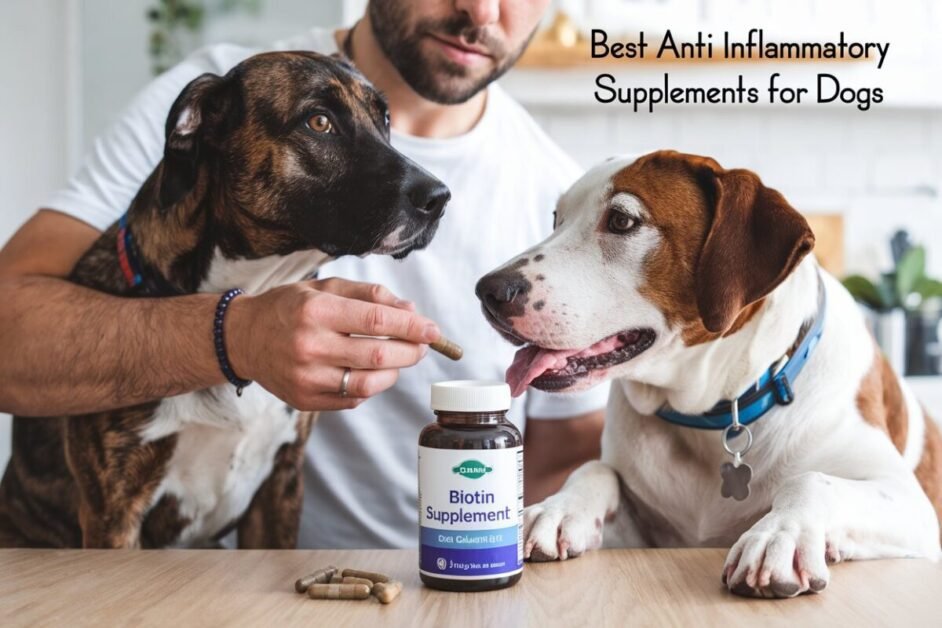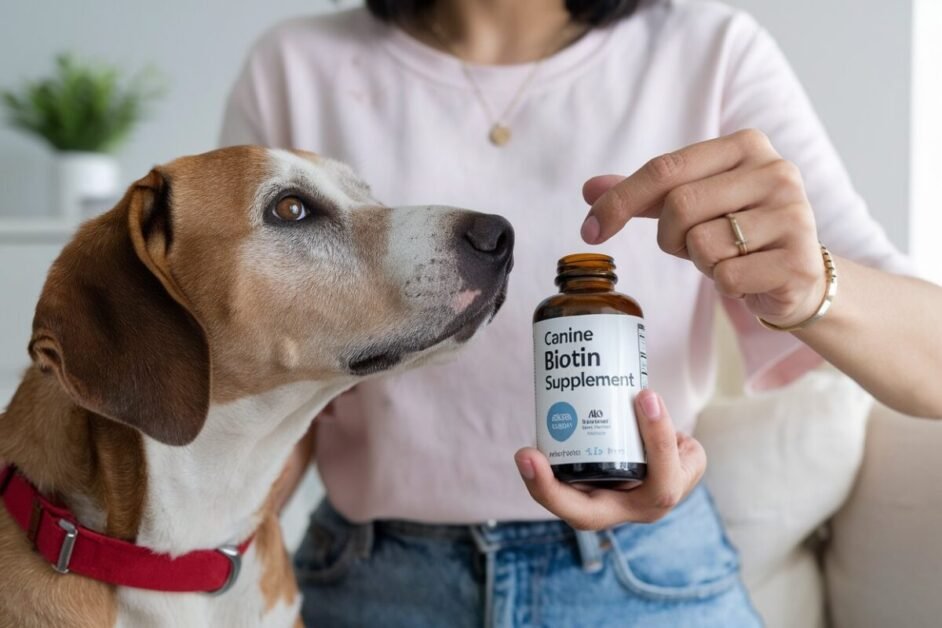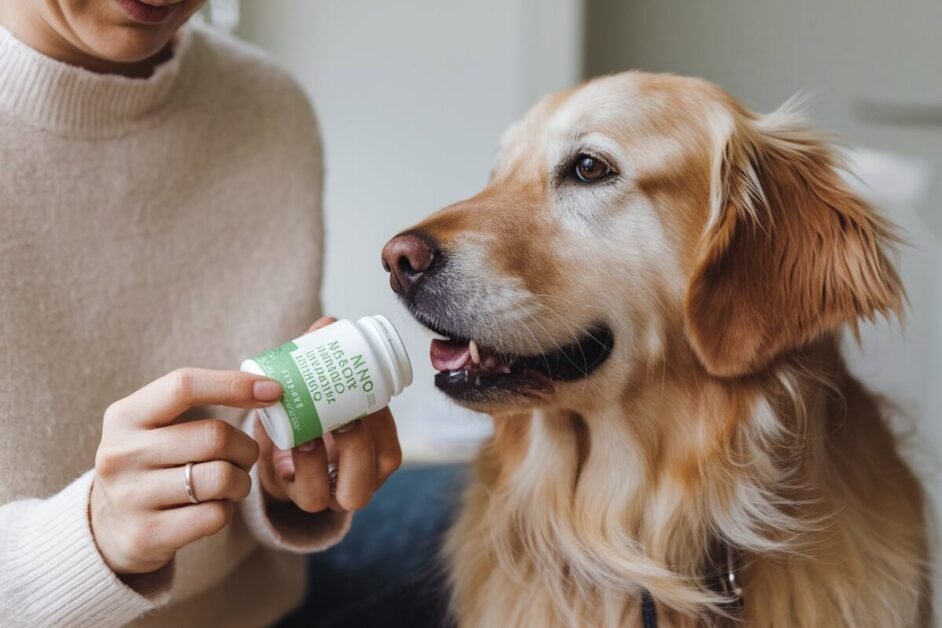Did you know that up to 8 in 10 dogs may suffer from osteoarthritis during their lifetime? This fact shows how crucial it is to understand and manage inflammation in our pets. Inflammation is more than just a short-term issue; it can lead to chronic pain and even shorten a dog’s life.
As pet owners, finding the right anti-inflammatory supplements for dogs is key to improving their quality of life. Knowing the best supplements for dog mobility and health can help your pet fight inflammation.
Key Takeaways
- 8 in 10 dogs may experience osteoarthritis, emphasizing the need for proactive care.
- Diet-related gut inflammation is a common health concern in dogs.
- Non-steroidal anti-inflammatory drugs (NSAIDs) may have side effects, including suppressed immunity.
- Herbal remedies such as Spirulina and Yucca can offer natural anti-inflammatory benefits.
- Chronic inflammation is linked to severe health issues, making management crucial.
- Understanding the types of supplements can lead to better health outcomes for pets.
- Consulting with experts can help tailor dietary needs for inflammation management.
Table of Contents
Understanding Inflammation in Dogs
Inflammation in dogs is a key way the body reacts to stress like injury, infection, or toxins. It helps with healing by causing redness, swelling, and warmth in affected areas. Knowing about the different types of inflammation helps in taking care of your dog’s health.
What is Inflammation?
Inflammation starts complex processes that turn on the immune system. It’s a way to protect the body from harmful things. When it happens, white blood cells go to the injury or infection site to help heal. But, if it lasts too long, it can cause serious health problems.
Types of Inflammation: Acute vs. Chronic
Inflammation comes in two main forms: acute and chronic. Acute inflammation is a quick response to injury or infection. It shows up fast and goes away in a few days or weeks, helping the body heal quickly. Chronic inflammation, on the other hand, lasts a long time and can cause serious issues like arthritis, stomach problems, allergies, and even some cancers in dogs.
- Acute Inflammation: Short-term response; resolves quickly.
- Chronic Inflammation: Long-lasting response; linked to various health complications.
It’s important to know the signs of both acute and chronic inflammation in dogs. This helps in getting the right treatment early, which can greatly improve your dog’s life.
Common Causes of Inflammation in Dogs
It’s important to know what causes inflammation in dogs to help them stay healthy. Inflammation can come from many things, each needing its own way to be managed. Here are some common causes pet owners should know about.
Injury and Strain
Injuries from accidents or too much play are big reasons for inflammation in dogs. These injuries can make a dog swell, hurt, and feel uncomfortable. It’s important to watch your pet closely after they fall or play too hard.
Dietary Factors and Food Allergies
What dogs eat can really affect their inflammation levels. Some high-fat foods or certain allergens can make their stomachs inflamed. It’s key to know about food allergies to stop inflammation. Taking out the bad foods can really help your dog feel better.
Environmental Triggers
Things in the environment can also make dogs inflamed. Pollen, dust mites, and chemicals in cleaners can cause itching and breathing problems. Keeping your home clean helps reduce these problems and keeps your dog healthier.
Signs and Symptoms of Inflammation in Dogs
It’s key to know the signs of inflammation in dogs for their health. Symptoms can show up in many ways. This helps owners spot issues that need a vet’s help.
Physical Symptoms
Physical signs are often easy to see. Look out for:
- Swelling in joints or body parts
- Redness around affected areas
- Pain or tenderness when touched
- Difficulty moving, which can indicate joint issues
- Changes in breathing patterns, especially if the respiratory system is involved
Behavioral Changes
Behavior changes can also point to inflammation. Owners might see:
- Decreased activity level, leading to more time resting
- Increased irritability or sensitivity to touch
- Reluctance to engage in play, which may indicate discomfort
- Changes in appetite, including either an increase or decrease
- Vocalizations that suggest pain or distress
Knowing these signs helps with early action, which can greatly improve a dog’s life. Watching your dog closely can help catch health problems early.
Types of Inflammation-Related Conditions in Dogs

Pet owners need to know about the different inflammation-related conditions that can affect dogs. These conditions show why it’s key to tackle inflammation early. This can make our pets healthier and more comfortable. Common issues include arthritis, stomach problems, and skin issues, each needing special care.
Osteoarthritis
Osteoarthritis is a common joint disease in dogs caused by cartilage breakdown. It leads to pain, stiffness, and less mobility. As dogs get older, arthritis becomes more common. Owners should look for early treatment and management options.
Gastrointestinal Inflammation
Gastrointestinal inflammation can be caused by food issues, allergies, or infections. Signs are vomiting, diarrhea, or not wanting to eat, which hurts a dog’s health. A diet full of anti-inflammatory foods and supplements can help manage these problems.
Skin Conditions like Dermatitis
Dermatitis in dogs is often caused by allergies or irritants. It shows as itching, redness, and discomfort, making life hard for dogs. Finding out what causes it and treating it with anti-inflammatory supplements can really help.
| Condition | Symptoms | Management |
|---|---|---|
| Osteoarthritis | Pain, stiffness, reduced mobility | Weight management, joint supplements |
| Gastrointestinal Inflammation | Vomiting, diarrhea, loss of appetite | Food adjustments, anti-inflammatory diet |
| Skin Conditions | Itching, redness, irritation | Dietary changes, anti-inflammatory treatments |
Why Consider Anti Inflammatory Supplements for Dogs?
Choosing anti-inflammatory supplements for dogs can greatly improve their health and happiness. These supplements offer key benefits of dog supplements for pets with inflammation issues. Owners should consider both natural and conventional treatments to make the best choices for their dogs.
Benefits of Supplementation
Anti-inflammatory supplements have many advantages for dogs, making their lives better. Here are some main benefits:
- They reduce pain and discomfort from chronic conditions like osteoarthritis.
- They help older pets move easier, making daily tasks less painful.
- They boost the immune system, helping dogs fight infections better.
- They are holistic, often with fewer side effects than traditional medicines.
Using these supplements can also cut down on the need for conventional treatments for dog inflammation. These treatments might include NSAIDs, which could cause side effects like stomach problems or kidney issues.
Natural vs. Conventional Treatments
Owners have to decide between natural remedies for dog inflammation and traditional medicines. Here’s a look at the differences:
| Treatment Type | Examples | Pros | Cons |
|---|---|---|---|
| Natural Remedies | Omega-3 fatty acids, Yucca, Ginger | Less side effects, holistic benefits, improves overall health | Effects may take longer, not as well-studied as traditional options |
| Conventional Treatments | NSAIDs like Carprofen, Steroids | Works fast, well-studied, proven to work | Possible severe side effects, risk of becoming dependent, doesn’t fix the root cause |
Knowing the benefits of dog supplements and the differences between options helps pet owners make informed choices. This leads to better care plans suited to each dog’s needs.
Best Anti Inflammatory Supplements for Dogs

Finding the right anti-inflammatory supplements can make a big difference in a dog’s life. Many products can help control inflammation and related issues, especially in big breeds that often get arthritis. Here are some top supplements known for their benefits.
Glucosamine and Chondroitin
Glucosamine and chondroitin are key for fighting inflammation in dogs. They keep cartilage healthy, easing arthritis symptoms like limping and less playfulness. You can give them to your dog as tablets or chews, making it easy to use.
- Advanced Hip & Joint Support: Formulated with glucosamine and chondroitin, these hip and joint chews for dogs promote he…
- Joint Pain Relief: Our dog joint supplement large breed includes natural ingredients known to alleviate joint pain and d…
- Enhanced Mobility for Active Dogs: These dog glucosamine chews aid in maintaining joint flexibility, allowing your dog t…

Omega-3 Fatty Acids
Omega-3 fatty acids, from fish oil, are vital for dogs’ health. They have strong anti-inflammatory effects, great for dogs with joint problems or at risk of osteoarthritis. These acids lessen stiffness and boost mobility, helping your dog feel better overall.
- A tasty & body nourishing treat for cats & dogs – Essential fatty acids for a healthy coat.
- Powerful Omega Fatty Acids – This premium fish oil liquid formula is loaded with the healthy Omega-3 fatty acid (with ep…
- Help your pet stay looking great – The rich Omegas in Salmon Oil are a dog health supply to nourish skin and coat and ke…











Curcumin and Turmeric
Turmeric is a top choice for dogs with joint issues. Curcumin, turmeric’s main part, fights inflammation well. Adding turmeric to your dog’s diet helps with inflammation and makes them more comfortable, making it a favorite among pet owners.
- Ease joint stiffness associated with daily activity with natural ingredients – Turmeric has been used for centuries as a…
- Gentle & natural for your pup – At Pet Honesty we’re committed to premium quality ingredients and strict safety standard…
- Right amount of actives + no fillers – Some turmeric curcumin soft chew supplements for dogs have unusually high amounts…











| Supplement | Benefits | Forms Available |
|---|---|---|
| Glucosamine | Supports cartilage health, reduces joint pain | Tablets, chews, liquids |
| Chondroitin | Helps maintain cartilage structure, reduces inflammation | Tablets, chews |
| Omega-3 Fatty Acids | Reduces inflammation, promotes heart health | Liquid, soft gels |
| Curcumin/Turmeric | Strong anti-inflammatory properties | Powder, capsules |
Choosing the right mix of these supplements can help dog owners keep inflammation under control. This supports their pets’ health and comfort over time.
Ingredients to Look for in Canine Supplements
Choosing the right canine supplements is key. Look for high-quality, bioavailable ingredients that boost your dog’s health. Here are some tips for picking the best ones.
What Makes a Good Supplement?
A top-notch supplement has important supplement ingredients made just for your dog. These ingredients help with overall health and specific issues. Some key ingredients include:
- Glucosamine: Keeps joints healthy.
- Chondroitin: Makes cartilage more hydrated and elastic.
- Omega-3 fatty acids: Found in fish oil, these are great for reducing inflammation.
- MSM: Helps cells rejuvenate and reduces inflammation.
- Turmeric with curcumin: A strong anti-inflammatory and antioxidant.
Importance of Quality and Sourcing
Quality matters when it comes to canine supplements. They should come from trusted sources that follow strict safety and effectiveness guidelines. Ingredients should be tested by third parties for purity and strength. Supplements with Great Salt Lake Salts are better because they improve nutrient absorption.
Recommended Dosages by Weight and Age
It’s crucial to use recommended dosages for dog supplements based on your dog’s weight and age. This ensures they work well and are safe. Here are some general guidelines:
| Weight (lbs) | Dosage (for Omega-3 Fatty Acids) | Dosage (for Green-Lipped Mussel) |
|---|---|---|
| 20 | 1 teaspoon daily | 30 mg |
| 40 | 2 teaspoons daily | 60 mg |
| 60 | 3 teaspoons daily | 90 mg |
Always talk to a vet before starting any supplements. They can help you find the right dosage and make sure it’s good for your dog’s health.
Potential Side Effects of Anti-Inflammatory Supplements


Pet owners often consider anti-inflammatory supplements for their dogs’ health. It’s key to know about possible side effects. Many supplements help, but some dogs may react. Watching your dog after starting a new supplement can spot problems early.
Common Reactions to Watch For
When giving anti-inflammatory supplements, watch for side effects in dogs. Look out for:
- Diarrhea
- Vomiting
- Constipation
- Lethargy
- Allergic reactions, which can manifest as skin irritations or itching
Keep an eye on your dog’s behavior after starting a new supplement. This is especially true for common ones like glucosamine, chondroitin, or fish oil. Each can affect dogs differently, so watch closely.
Precautions and Interactions with Other Medications
Be careful with dog supplements. Some can interact with other medicines, causing bad effects. Always talk to a vet before starting a supplement, especially if your dog has health issues or is on other treatments.
For example, NSAIDs are used to reduce inflammation. Mixing them with some supplements can increase the risk of serious side effects. These can affect the stomach, liver, or kidneys. If your pet acts strangely after starting a supplement, call a vet right away.
Telling your vet about any supplements you give your pet is key to safety. These steps help make sure your dog gets the benefits without the risks.
Natural Remedies and Complementary Therapies
Looking into natural remedies and therapies for dogs can help keep your pet healthy. These options work well with traditional treatments. They also help with holistic care for dogs’ joints.
Herbal Remedies for Inflammation
Herbs can be a great support for fighting inflammation. Some popular herbs include:
- Ginger: Known for its anti-inflammatory effects, ginger can ease joint pain and boost movement.
- Yucca: Used to lessen arthritis symptoms, yucca is thought to reduce inflammation and pain.
- Devil’s Claw: This herb is traditionally used to fight inflammation. It may help dogs with osteoarthritis feel better.
Adding these natural remedies to your dog’s care plan can boost their health. It can also help with inflammation issues.
Physical Therapy and Lifestyle Changes
Therapies for dogs can really make a difference in their lives. Some good practices are:
- Physical therapy: Custom exercises can make muscles around joints stronger. This helps with better movement and less pain.
- Weight management: Keeping your dog at a healthy weight is key for joint care. It reduces stress on their joints.
- Regular exercise: Activities like swimming or walking can keep joints healthy and flexible.
For the best results against inflammation, mix herbal remedies with physical therapies. This approach can lead to better joint function and a happier life for your pet.
Signs of Nutritional Deficiencies and Inflammation
Nutritional deficiencies can really hurt a dog’s health and make inflammatory conditions worse. Important nutrients help keep the immune system strong, skin healthy, and overall energy high. Spotting these deficiencies early can stop serious health problems in dogs.
Health Issues Related to Deficiencies
It’s key to know the signs of deficiencies to keep your dog healthy. These can cause many health issues in dogs, showing up as clear symptoms. Here are some common problems linked to nutritional shortages:
- Vitamin D Deficiency: About 75% of dogs lack this vitamin. It can cause allergies, intolerances, and more.
- Immunity Problems: Not enough vitamin D weakens the immune system. This can lead to hair loss and inflammation, especially during allergic reactions.
- Pain and Discomfort: Dogs with muscle pain might be low on vitamin D. Boosting their vitamin D can help ease this pain.
- Bone Health: A lack of this vitamin can make bones weak, raising the chance of breaks and bone pain.
- Behavioral Concerns: Dogs might act restless, sleep poorly, feel anxious, or depressed if their vitamin D is low.
- Muscle Weakness: A deficiency can make muscles vary in strength, affecting how well they move.
- Skin and Coat Health: About 25% of vet visits are for skin and hair problems. Lack of nutrients like copper and zinc can cause dull, dry skin and skin issues.
What a dog eats is key to fixing these health problems. Omega-3 fatty acids from cold-water fish can help with inflammation in dogs. Regular vet check-ups can spot nutritional deficiencies in dogs, helping with diet and keeping them healthy.
| Nutrient | Deficiency Effects | Sources |
|---|---|---|
| Vitamin D | Allergies, hair loss, bone weakness | Oily fish, egg yolk, liver, red meats |
| Copper | Dull coat, patchy hair loss | Liver, seafood, nuts |
| Zinc | Hair loss, skin ulcers | Meat, fish, eggs, grains |
| Omega-3 Fatty Acids | Skin diseases, inflammation | Fish oil, flaxseed oil |
Costs and Budgeting for Dog Supplements
Understanding the costs of dog supplements is key for pet owners. Prices vary by brand, ingredients, and dosage. Finding quality and affordability is crucial for your pet’s care without breaking the bank.
Understanding Value for Quality
It’s not true that a higher price means better quality. Checking the ingredients is key. Pet Honesty Wild Caught Omega-3 Fish Oil is a great choice, with 720 mg of EPA and 475 mg of DHA at a good price. It’s made for different dog sizes and helps with joint health.
Products like Vetoquinol Flexadin Advanced mix collagen and omega-3 fatty acids. This is good for all dogs.
- Joint Health Support for Dogs: Cosequin, the veterinarian recommended retail joint health supplement brand, contains glu…
- Easy to Serve: Cosequin Maximum Strength Joint Health Supplements come in tasty chewable tablets and soft chews for dogs…
- Manufactured in the United States with Globally Sourced Ingredients: Cosequin is a high-quality, dog joint supplement











- VETERINARIAN RECOMMENDED – Formulated by Dr. Joseph, a veterinarian with over 30 years of experience relieving his patie…
- 5X MORE GLUCOSAMINE – Damage to the joints and the surrounding tissue are common injuries for dogs and cats. Our dog hip…
- RELIEF FROM INFLAMMATION – If your dogs or cats love to play, then they’ll likely end up with painful swelling in their …











- Taste great, no mess, small and easy to chew bite-sized bacon and beef liver flavored tablets your pet will love, perfec…
- No byproducts, no allergies, Made in America and hypoallergenic; Works great for allergy prone dogs; No wheat, corn, mal…
- Make your dog look & feel great with the ultimate chewable turmeric curcumin anti-oxidant supplement for strong joints &…











- Joint Health Support for Dogs: Cosequin, the veterinarian recommended retail joint health supplement brand, contains glu…
- Easy to Serve: Cosequin Maximum Strength Joint Health Supplements come in tasty chewable tablets and soft chews for dogs…
- Manufactured in the United States with Globally Sourced Ingredients: Cosequin is a high-quality, dog joint supplement











- VETERINARIAN RECOMMENDED – Formulated by Dr. Joseph, a veterinarian with over 30 years of experience relieving his patie…
- 5X MORE GLUCOSAMINE – Damage to the joints and the surrounding tissue are common injuries for dogs and cats. Our dog hip…
- RELIEF FROM INFLAMMATION – If your dogs or cats love to play, then they’ll likely end up with painful swelling in their …











- Taste great, no mess, small and easy to chew bite-sized bacon and beef liver flavored tablets your pet will love, perfec…
- No byproducts, no allergies, Made in America and hypoallergenic; Works great for allergy prone dogs; No wheat, corn, mal…
- Make your dog look & feel great with the ultimate chewable turmeric curcumin anti-oxidant supplement for strong joints &…











- What is UC-II – A clinically backed proprietary form of type II collagen that works differently than chondroitin and glu…
- How Does UC-II Work – Our dog joint supplement works with your pet’s immune system to help reduce soreness and discomfor…
- More effective than Glucosamine – Our clinically proven and veterinarian-developed hip and joint supplement for dogs has…











Where to Buy Affordable Supplements
Looking for good deals on dog supplements means checking online and in stores. Many trusted stores offer supplements at good prices. Websites like Chewy, Petco, and Amazon often have discounts or subscription deals.
Also, try local pet shops for deals on brands like NaturVet or Nutramax. These brands make great joint health products. Buying from trusted sources keeps your pet safe and fits your budget.
Recipes for Homemade Anti-Inflammatory Treats
Making homemade anti-inflammatory treats is a great way to keep your dog healthy and happy. You can use ingredients like sweet potatoes, pumpkin, and turmeric to boost their nutrition. Adding lean ground sirloin is also key, especially for dogs with kidney issues.
Using Anti-Inflammatory Ingredients
Healthy dog treats can include many nutritious parts. Lean ground sirloin is low in phosphorus, good for dogs with kidney problems. Quinoa is a great starch source full of protein. Carrots and green beans add vitamins A, potassium, and iron.
Adding omega-3s from chia seeds or fish oil makes the treats even better. These ingredients work together to fight inflammation and support your pet’s health.
Try these recipes: Salmon and Sweet Potato Stew is tasty and healthy. Chicken and Bone Broth Soup is another great option, with chicken and blueberries for antioxidants. Beef and Vegetable Medley is perfect for dogs, with lean beef and anti-inflammatory veggies.
By making these treats at home, you can help your dog fight inflammation and enjoy tasty meals.






























